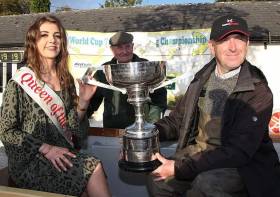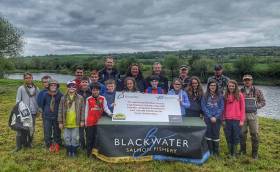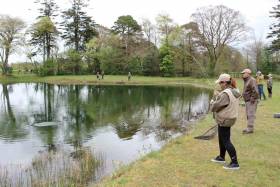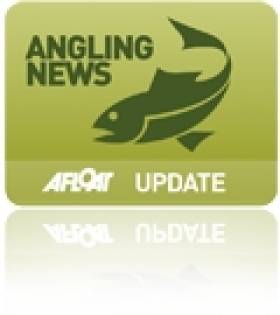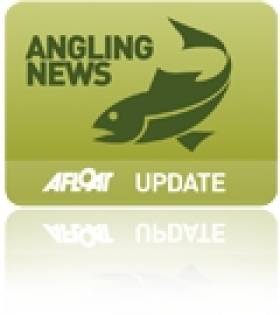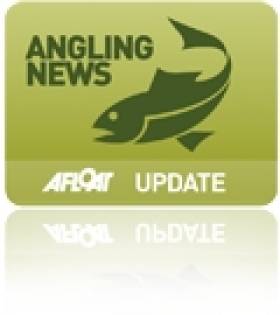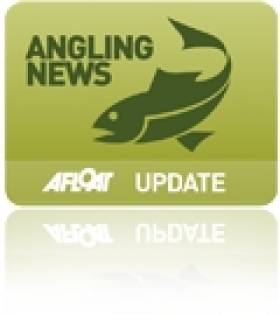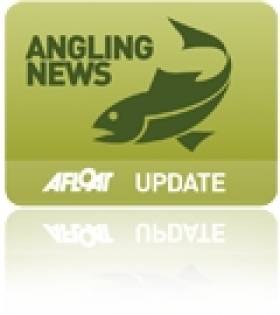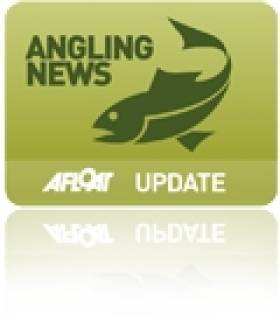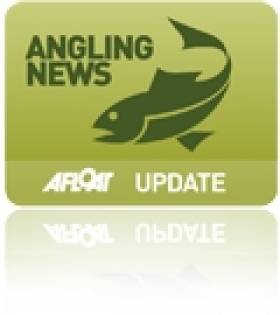Displaying items by tag: fly fishing
Fly World Cup Goes To Leitrim Angler After Month-Long Championship
Leitrim angler Bernard Kilkenny claimed the World Cup in trout fly angling on Lough Mask last weekend, as Derek Evans notes in today’s Irish Times.
His five trout at 5.73lb secured the title — as well as a boat with 15HP outboard, and a new rod and reel — in what was “the most drawn-out in the 63 years of the championships”, with poor weather meaning three attempts over a whole month were required.
Elsewhere, two anglers caused a headache for marine wildlife lovers in Wicklow yesterday (Sunday 8 September) when they were spotted fishing just meters from a protected seal colony.
According to Wicklow News, the men had ignored signs warning away from the seals, as well as the pleas of several onlookers, but left the area after they were spoken to by gardaí.
It is recommended that the public stay at least 100 metres away from seals as they enter their breeding season and seek safe space on land from September to the end of the year.
#Angling - Bandon Scouts recently attended a fishing tuition day organised by Bandon Angling Association and supported by Inland Fisheries Ireland (IFI).
In total, 15 scouts took part in the angling day, which saw them learn the basics of fly fishing, water safety, fish biology and ecology on the Munster Blackwater.
Bandon Angling Association received sponsorship for the event from IFI’s Sponsorship Scheme, which supports angling events and initiatives across the country.
The Sponsorship Scheme was announced in December 2016 with applications invited from anglers, angling clubs and organisations nationwide.
Overall across the country, the scheme is supporting 79 initiatives in 2017 to the tune of €30,000 with a focus on those which help grow Ireland’s angling tourism product and support novice anglers.
Bandon Angling Association’s Scout Day is one of six angling initiatives in Cork to receive sponsorship this year.
The initiative saw children participate in theoretical and practical lessons with renowned fly fishing instructor Glenda Powell from Waterford, who led the tuition day.
The scouts were also taught how to fly cast with support from members of Bandon Angling Association.
#Angling - Breast cancer survivors gathered at Mount Falcon in Ballina last weekend for a angling retreat organised by Casting For Recovery and supported by Inland Fisheries Ireland (IFI).
Thirteen women from Belfast, Cork, Dublin, Fermanagh, Galway, Mayo and Cambridge in the UK attended the free fishing retreat which incorporated medical advice, education services, counselling and relaxation techniques.
The retreat was delivered by trained professionals including a psycho-social therapist, a health care professional as well as qualified fly fishing instructors and fishing guides.
Casting for Recovery UK & Ireland is a flagship project of The Countryside Alliance Foundation, a charity dedicated to increasing access to the countryside and helping as many people appreciate the great outdoors in the UK and Ireland.
Casting for Recovery provides an opportunity for women who have gone through a breast cancer journey to attend a retreat at a spectacular venue to learn the art of fly fishing.
This was the eighth year which the initiative has been held at Mount Falcon, with participants receiving fly fishing coaching and advice from local volunteers.
Many previous participants have taken up fly fishing as a hobby, with one even graduating to fish on the Irish Women’s Team – selections for which have begun ahead of the 2018 Home Internationals, according to The Irish Times.
The event was supported by IFI’s Sponsorship Scheme for angling events and initiatives across the country.
As previously reported on Afloat.ie, the scheme will support 79 initiatives in 2017 to the overall tune of €30,000, with a focus on those which help grow Ireland’s angling tourism product and support novice anglers.
In other angling news, the Irish Federation of Sea Anglers has announced its junior and youth teams to represent Ireland at this year’s Junior Shore Angling Worlds on the Cote d’Opale in Northern France, as the Belfast Telegraph reports.
Ireland Win Fly Fishing Gold In Home Nations Cup
#Angling - Ireland took the gold medal at the Chatton Lakes Home International fly fishing competition in Northumberland to close out a successful 2014.
As The Irish Times reports, the Trout Angling Federation of Ireland Stillwater Bank Fly Fishing Team took on squads from England, Scotland and Wales at the prestigious fishery for the inaugural Nations Cup.
And Derek Evans writes that they got the edge on their opponents thanks in no small part to a scouting mission two weeks before the tournament.
Junior Fly Fishing All-Irelands Coming This Weekend
#Angling - Tyrones's Fintona waters will come alive this weekend for the All-Ireland Junior Fly-Fishing Championships on Sunday 31 August, as the Ulster Herald reports.
Kicking off in Donegal on Saturday 30 August, Ireland's best young anglers aged between 15 and 18 will compete on some of the same lakes that hosted last year's Youth Fly Fishing Worlds in the border region, and are set to host the best in the world again next year.
The Ulster Herald has much more on the story HERE.
#Angling - The Galway Independent shines the spotlight on 15-year-old Ciarán Reilly, vice-captain of the cross-border Irish junior angling team headed to Wales nest week for the Home Counties International.
The Loughrea lad has already been selected as captain of next year's under-18 squad, but isn't looking past the stiff competition from across the UK at Llyn Brenig reservoir in North Wales on 7 August.
“I’d be fairly confident with the team this year,” he said with some understatement.
#Angling - The World Youth Fly Fishing Championship is coming to Ireland's border region next month.
And as the Carrick Times reports, Carrickfergus in Co Antrim is looking forward to hosting part of the event at the Woodford Fly Fishery.
What's more, local lad and Woodford member Darren Crawford will be among the all-Ireland fly fishing squad vying for the international title at the event, co-sponsored by the Loughs Agency and Inland Fisheries Ireland.
Rivers and lakes hosting the competition are spread over the counties of Antrim, Louth, Monaghan, Meath and Tyrone.
In other inland fisheries news, Galway Bay FM reports that testing carried out after a fish kill in Loughrea Lake last month found no evidence of any bacterial or viral outbreak.
The cause of the incident that killed 100 perch in the lake are still unclear, though stresses connected with the spawning season are a distinct possibility.
#ANGLING - A revolutionary new fly-carrying package aims to eliminate the annoyance of going back and forth to replenish your bait supply, as The Irish Times reports.
The Jodea, developed and patented by fly-fisherman Jeremiah O’Dea, can be clipped to an angler’s belt or jacket to hold everything he or she needs mid-stream.
The pack is collapsible and stores as a flat pack, but can telescope forward when required and includes a felt pocket for braids and hook storage.
Launched at last November's Irish Fly Fair and Angling Show, the new invention is considered a necessity for natural bait fly-fishers such as dappers, and is soon to be available in tackle shops nationwide.
For more information visit the Jodea Facebook page or buy online from TheJodea.com.
NI Fields First Full Team at Commonwealth Fly Fishing Championships
#ANGLING - Two Newtownabbey anglers are part of a six-man Northern Ireland team competing at the 2012 Commonwealth Fly Fishing Championships, which started yesterday in Tasmania.
The Newtonabbey Times reports that Kenny Ferguson and team captain Alan R McDade set out for the Australian island last Wednesday for the competition that runs till 19 February.
They join Campbell Baird and Harvey Hutchinson from Carrickfergus, Banbridge angler Neil Cardwell and Harry McAteer Jr from Belfast for the week-long contest.
The six - who qualified from contests held throughout Ireland organised by the Trout Anglers Federation of Ireland - also comprise the first full team that Northern Ireland has entered in the competition.
Angling Classic Among Items Auctioned from Hanna Collection
A 19th-century book on angling fetched €820 at an auction of bookseller Fred Hanna's private collection earlier this week, The Irish Times reports.
The classic title The Erne, Its Legends and Its Fly Fishing by the Rev Henry Newland exceeded its auction estimate of €500-€700 when it went under the hammer in Ballsbridge on Tuesday.
It was one of many rare books and other items that sold from the late bookseller's collection for a total of €350,000.
Other marine-related items included Lady Gregory's copy of JM Synge's The Aran Islands with drawings by Jack B Yeats, which sold for €12,000, and a first edition of Jame Joyce's Ulysses - much of which is set in the coastal suburb of Sandymount - which fetched €8,250.



























